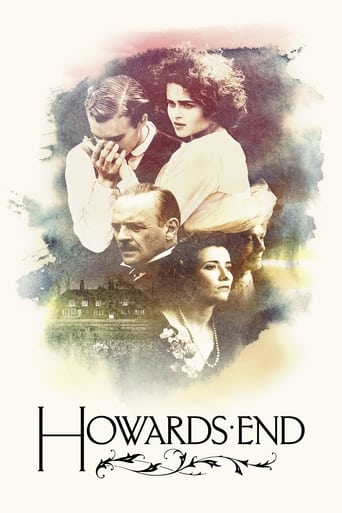Matt Greene
Look, Howards End is a competent, mildly intriguing Merchant Ivory production about the paranoia of the wealthy. Mostly though it's over 2 hours of proof as to why I don't and have no desire to watch Downton Abbey. Posh people have quietly regal discussions, a sudden outburst of drama temporarily disrupts the nobility, repeat.
writers_reign
Although fairly engrossing this tends to lose its lustre after the first half hour which is roughly the point at which Vanessa Redgrave's character is killed off. Ms Redgrave is the best thing by far in the film and though Anthony Hopkins and Emma Thompson just about keep her from actually lapping them she leaves them for dead. Samuel West is hopelessly miscast which has the effect of making him seem inept whilst Helena Bonham-Carter wanders about ineffectually as if waiting for guidance in how to approach her role. In terms of overall appearance, period feel, etc, it's hard to fault the film and the social comment is on the mark albeit probably lost on two thirds of the audience. A lush, well-appointed soap.
mark.waltz
What seems on the surface a simple tale of one woman's gift to another is much more complex in this story of one upper class family's involvement with two sisters, not so well off, but obviously of higher morals than some of the members of those who consider themselves everybody else's "betters". The story initially focuses on Helena Bonham Carter's Helen, a middle class lady who is involved with the upper class Joseph Bennett but unable to marry him because of his issues with his family. By chance, Carter's sister Margaret (Emma Thompson) meets the ailing matriarch of Bennett's family (a very subtle and gentle Vanessa Redgrave) who sees something special in the classy Margaret. On her death bed, Redgrave writes in pencil the desire to leave her childhood home, Howard's End, to Thompson, but at a family meeting, widower Anthony Hopkins is manipulated into preventing that by his other son (James Wilby).Encounters on occasion with Thompson brings Hopkins' sudden proposal, perhaps out of loneliness, maybe out of guilt, but within time, growing into love. Carter and Thompson's friendship with a struggling clerk (Samuel West) causes all sorts of issues, especially when West's common wife (Nicola Duffett) comes to a wedding, gets drunk, and reveals a past with Hopkins. This becomes a story then, not only of a family deception, but the ties that bind all mankind, either through obligation, unexpected human interaction or in Hopkins and Duffett's case, a brief lust that tears away at him because of the differences in their social standing. West struggles, not only to try and find a new position after his suddenly ends, but with his feelings for Carter as well and his disgust in his marriage to Duffett. The so-called polite upper class becomes murderous in a shocking twist towards the end, and this explodes into many questions of what exactly is good breeding, and who has it.Powerful performances by a magnificent cast gives this family drama a mesmerizing feel, just as dramatic as all six seasons of "Downton Abbey" whittled down to two and a half hours. There are comic bits here and there that prevent the film from becoming too staid, and the set-up of gentle matriarch Vanessa Redgrave making you care about what happens to her will require the need of Kleenex near by as her light fades and the story moves into new directions. Hopkins, playing a very conflicted man, shows all the human dimensions that makes this character very real, whether grieving over a wife he really didn't spend too much time caring about it seems in life, facing his own ordeal as an adulterer, or unable to forgive himself, both for cheating, keeping the truth away from Thompson and lastly, realizing what a bunch of greedy, selfish offspring he's raised. Prunella Scales is very funny in a small part as Carter and Thompson's no nonsense aunt. Carter and Thompson are wonderfully cast as sisters, and while Thompson has the meatier part, Carter is impressive as well. She's moved on from "A Room With a View" to showing here all the tricks she'll later pull out in her character parts in Tim Burton movies. Thompson, deservedly winning an Oscar, is an actress of such gifts, and from the moment you meet her, she's somebody you'll want as a friend as much as Redgrave did. She faces tragedy with such dignity, being independent and resourceful, yet willing to stand by her man no matter how bad things become because she sees the truths that most humans are blind to. It's the writing surrounding these characters that make "Howard's End" a joy to revisit, and while the country home may not be immense like Downton Abbey, you can see why Redgrave adored it and would only want to see it in the hands of somebody she knew would treasure it like she did.
T Y
Though lambasted by a minority as a Merchant/Ivory snoozer, Howard's End eventually inveigles its way into a thoughtful viewers mind with rather abundant ideas and plots about agency, good intentions in a weary/cynical world, passive cruelty, active cruelty, material transference, and cultural ascent, all stitched together in a story of class warfare, with surprising, sometimes hypocritical motivations. No one behaves as expected; as with Thompson selling out her values in preference to ascent; and the generally awful Hopkins secreting his true, malevolent nature, while fate endeavors to correct it in a roundabout way.There is far more than most films provide to digest. And the ideas put into play are far more interesting than other movies deign to investigate, and certainly better than other similar chatty, period Emma Thompson films (Sense and Sensibility) which are fatal to the life urge. It's also superior to Remains of the Day (also with Thompson and Hopkins). One can imagine a much more modern, intriguing film (not bogged down with politeness and high production values) with these ideas, but this is the film we've got; and it's fine.At no point can you guess where the circumlocutions will take you. Howard's End is a knot tied back into itself a half dozen times. I find its complexity extremely pleasing. Suffice it to say, this is 'Final Destination' for the thoughtful set.












